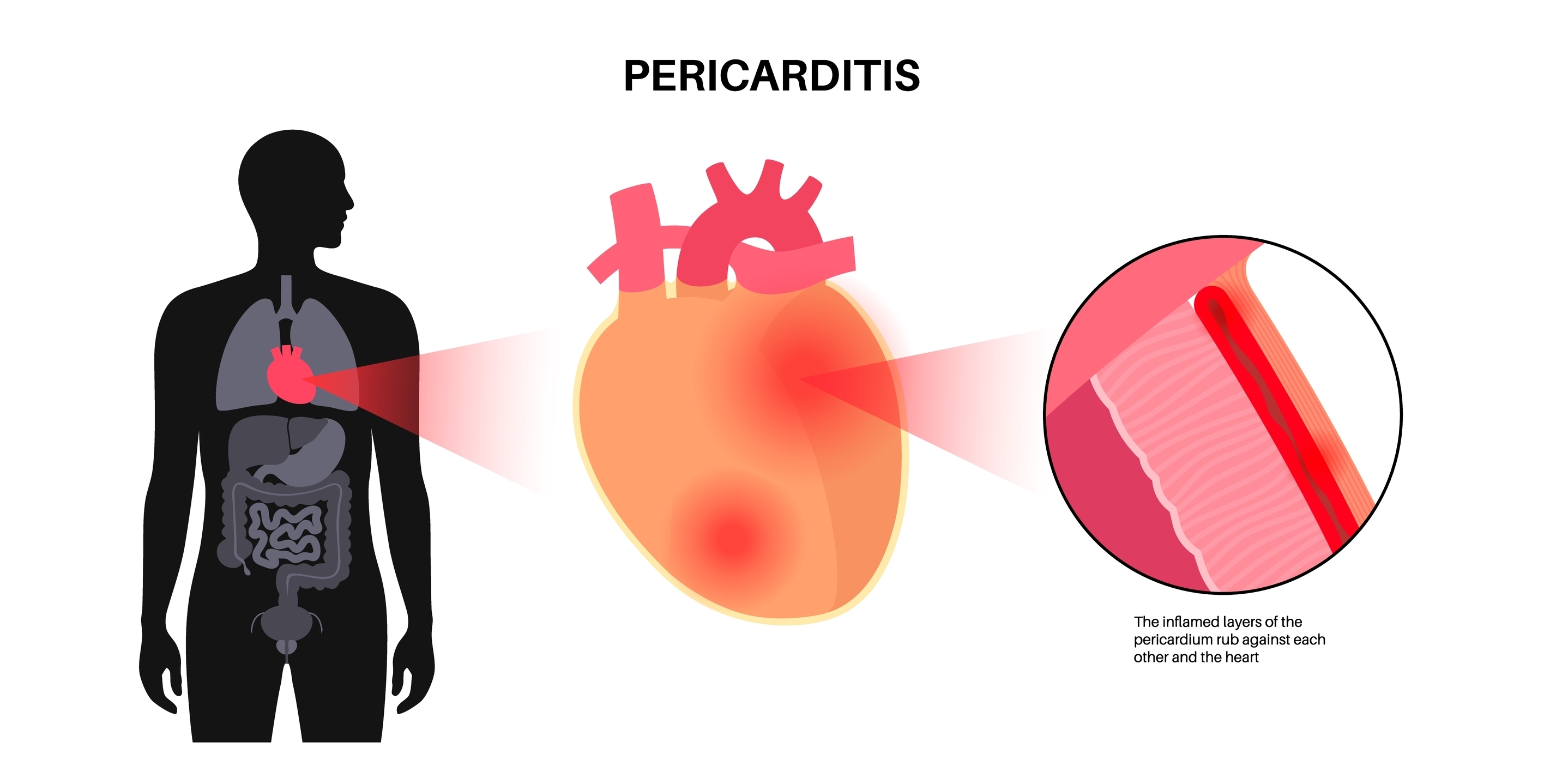Pericarditis Treatment in Turkey
Healthy Türkiye helps you find the best pericarditis treatment in Turkey at affordable prices and adopts a 360-degree service approach in all areas of health through affiliated hospitals.
- Medical Treatment
- Cardiology Treatment in Turkey
- Carotid Artery Stenting in Turkey
- Cerebrovascular Disease Treatment in Turkey
- Colour-Duplex Sonography in Turkey
- Pericarditis Treatment in Turkey
- Peripheral Artery Disease Treatment in Turkey
- Coronary Heart Disease Treatment in Turkey
- EECP Treatment in Turkey
- Congenital Heart Treatment in Turkey
- Electrophysiology Study in Turkey
- Nuclear Cardiology Test in Turkey
- Pediatric Cardiology Treatment in Turkey
- Rheumatic Heart Disease Treatment in Turkey
- Spiro-Ergometry in Turkey
- Homepage
- Medical Treatment
- Pericarditis Treatment in Turkey

About Pericarditis Treatment in Turkey
Pericarditis treatment in Turkey is focused on an inflammation of the pericardium, which is the sac that houses your heart. Most people respond favorably to timely treatment, rest, and medicine. Others may require pericardium fluid drainage surgery. In most circumstances, people recover completely. It may, however, take weeks or months. Pericarditis is an inflammation of the pericardium, which is the sac that houses your heart. Most people respond favorably to timely treatment, rest, and medicine. Others may require pericardium fluid drainage surgery. In most circumstances, people recover completely. It may, however, take weeks or months.
The illness normally goes away after three months, but episodes might last for years. Pericardial effusion occurs when there is extra fluid in the space between the pericardial layers. Types of pericarditis are:
Acute pericarditis: Pericardial inflammation that occurs rapidly along with the beginning of symptoms.
Chronic pericarditis: Pericardial inflammation that lasts three months or longer after the initial acute incident.
Constrictive pericarditis: A severe form of pericarditis in which the pericardium’s inflammatory layers stiffen, produce scar tissue, thicken, and stick together. Constrictive pericarditis impairs the natural function of your heart. This frequently occurs after a series of acute pericarditis episodes.
Infectious pericarditis: It is caused by a viral, bacterial, fungal, or parasitic infection.
Idiopathic pericarditis: Pericarditis that has no recognized cause.
Traumatic pericarditis: Develops as a result of a chest injury, such as in a vehicle accident.
Uremic pericarditis: It occurs as a result of kidney failure.
Malignant pericarditis: As a result of a cancer growing in your body, it develops.
Depending on the suspected etiology, most persons with pericarditis just require drugs for pericarditis treatment. If you have a fluid buildup in your pericardium, the fluid may need to be drained. You may require surgery if you have constrictive pericarditis.

Pericarditis Treatment Procedure in Turkey
Pericarditis treatment in Turkey deals with an inflammation of the heart’s lining. The most common pericarditis symptom is chest discomfort. Pericarditis can be painful, but it is usually not dangerous, and most individuals recover within a few weeks.
Pericarditis is an inflammation of the pericardium (the protective sac that surrounds your heart). Inflammation is your body’s defense mechanism against potentially harmful substances, such as infections or injuries, in order to cure itself. When your pericardium is irritated, you may experience symptoms that interfere with your daily life.
Pericarditis can occur in conjunction with myocarditis (inflammation of the heart muscle), and the symptoms are similar. Myopericarditis is a condition in which you have both pericarditis and myocarditis.
The doctor will review therapies with you and determine which one is best for you. Some people find it helpful to plan out their questions ahead of time and jot them down on paper or on their phone so they don’t forget to bring them up with their doctor. The following are some questions you may want to ask your doctor:
What are my next steps?
Any advice on how to deal with the symptoms?
When and how can I start exercising again?
When and how can I go back to work?
Most people recover from pericarditis within a few weeks, although it might take months for some. Dealing with persistent pericarditis symptoms can be difficult, but with the correct assistance, it is possible to live a normal life – learn more about the emotional help available.
Symptoms of Pericarditis Treatment
Pericarditis treatment in Turkey is for an inflammation of the pericardium, which is the sac that surrounds and supports the heart. Pericarditis can be caused by infections, cardiac attacks, trauma, cancer, and autoimmune illnesses, and it can be acute (short-term) or chronic (long-term).
When the pericardium’s tissues become inflamed, it might alter how your heart functions. Pericarditis is often minor and resolves on its own, but it can be serious and lead to life-threatening consequences if not treated properly. Pericarditis symptoms include:
Chest pain
Low-grade fever
Increased heart rate
In many situations, it is unknown what causes pericarditis to develop. Acute pericarditis is frequently caused by viral infections, such as respiratory illnesses like influenza or gastrointestinal viruses. Bacterial (such as tuberculosis), fungal, and parasitic illnesses can all cause pericarditis, but they are far less common in the United States due to the low prevalence of TB and fungal and parasitic infections. Autoimmune diseases such as lupus, scleroderma, and rheumatoid arthritis are the most common causes of chronic pericarditis.
Diagnosis for Pericarditis Treatment in Turkey
Pericarditis treatment in Turkey is a medical procedure for pericardial inflammation. The heart is surrounded by a thin sac (membrane). The pericardium keeps the heart in position and allows it to function properly. A minor amount of fluid exists between the pericardium’s inner and outer layers. As the heart rotates to pump blood, this fluid prevents the layers from rubbing together.
Your doctor may also examine you for pulsus paradoxus. When you take a big breath, your blood pressure lowers more than usual. Changes in your chest pressure prevent blood from returning from your body and entering your heart. This could be a symptom of significant fluid buildup in the pericardial area. Certain tests may be required in addition to a health history and physical exam. These could include:
Echocardiogram (echo): This test use sound waves to determine the size and shape of your heart. As an ultrasound transducer is run over the skin above the heart, the echo sound waves create a picture on a screen. Echo can reveal how well your heart is operating and whether fluid has accumulated around it.
Electrocardiogram (ECG): This test measures the strength and timing of the heart’s electrical activity. It detects irregular cardiac rhythms and can occasionally detect heart muscle injury. To detect electrical activity, little sensors are glued to your skin.
Chest X-ray: An X-ray may be taken to examine your lungs and determine whether your heart is enlarged.
Cardiac MRI: This imaging procedure produces comprehensive images of the heart. It can be used to look for pericardium thickening or other alterations.
Cardiac CT: This X-ray provides a clear, detailed image of your heart and pericardium. It may be used to rule out other possible causes of chest pain.
Blood tests: Certain blood tests can assist in ruling out other heart issues, such as a heart attack. They can also inform your doctor how much inflammation is present in your body.
Pericarditis treatment will be determined by the underlying cause. Antibiotics may be prescribed if you have a bacterial infection. Pericarditis is typically mild and usually resolves on its own with modest treatment such as anti-inflammatory drugs and rest. Your doctor may initially treat you in the hospital if you have significant medical risks. The goal of treatment is to relieve your pain and inflammation while also lowering your chance of recurrence.

We Care About Your Health
Healthy Türkiye provides the best for your health and comfort. You will feel privileged with us.
7/24 Quality Personal Assistance Throughout Your Journey
Customizable for You All-Inclusive Packages
Get the Right Advice for your Health
Types of Pericarditis Treatment in Turkey
Pericarditis treatment in Turkey is determined by the origin and severity of the symptoms. Mild pericarditis may resolve on its own. The pericardium is an inner and outer layer that surrounds the outer surface of the heart. Pericarditis is defined as pericardium inflammation or infection. Various viruses and bacteria cling to the cardiac membrane and impair its function. Fluid collection can be detected between the layers of the vascular membrane when there is inflammation.
If this volume of fluid is excessive, it might compress the heart and produce cardiac tamponade, which necessitates immediate medical attention. Acute pericarditis is described as abrupt inflammation of the pericardium followed by healing within three months, whereas chronic pericarditis is defined as problems that persist and reoccur for longer than three months.
Medications for Pericarditis Treatment in Turkey
Medication to relieve inflammation and swelling is frequently recommended. Here are several examples:
Pain relievers: Pain from pericarditis is typically treated with over-the-counter pain medications such as aspirin or ibuprofen (Advil, Motrin IB, others). Prescription pain medications may also be used.
Colchicine (Colcrys, Mitigare): This medication helps to reduce inflammation in the body. It is used to treat acute pericarditis or if symptoms reoccur. If you have liver or renal illness, you should not use this medication. Colchicine might also interact with other medications. Before administering colchicine, your doctor will thoroughly review your medical history.
Corticosteroids: Corticosteroids are potent anti-inflammatory drugs. If alternative drugs do not relieve pericarditis symptoms or if symptoms reappear, a corticosteroid such as prednisone may be recommended.
If the pericarditis is caused by a bacterial infection, medications and drainage may be required.
Surgeries or Other Procedures for Pericarditis Treatment in Turkey
If pericarditis causes fluid buildup around the heart, surgery or another technique to drain the fluid may be required. Pericarditis can be treated with surgery or other techniques such as Pericardiocentesis. A sterile needle or a tiny tube (catheter) is used in this technique to remove and drain excess fluid from the pericardial cavity. Pericardium extraction (pericardiectomy). If the sac enclosing the heart becomes chronically inflexible owing to constrictive pericarditis, the entire pericardium may need to be removed.

2026 Cost of Pericarditis Treatment in Turkey
All types of medical attention like pericarditis treatment are very affordable in Turkey. Many factors are also included in determining the cost of pericarditis treatment in Turkey. Your process with Healthy Türkiye will last from the time you decide to have a pericarditis treatment in Turkey until the time you are fully recovered, even if you are back home. The exact cost of a pericarditis treatment procedure in Turkey depends on the type of operation involved.
The cost of pericarditis treatment in Turkey does not demonstrate many variations in 2026. Compared to costs in developed countries like the United States or the UK, pericarditis treatment costs in Turkey are relatively low. So, it’s no wonder patients from across the world visit Turkey for pericarditis treatment procedures. However, price is not the only factor affecting choices. We suggest looking for hospitals that are safe and have pericarditis treatment reviews on Google. When people decide to seek medical help for pericarditis treatment, they will not only have had low-cost procedures in Turkey, but also the safest and best treatment.
At clinics or hospitals contracted with Healthy Türkiye, patients will receive the best pericarditis treatment from specialist doctors in Turkey at affordable rates. Healthy Türkiye teams provide medical attention, pericarditis treatment procedures and high-quality to patients at a minimum cost. When you contact Healthy Türkiye assistants, you can get free information about the cost of pericarditis treatment in Turkey and what this cost covers.
Why Is Pericarditis Treatment Cheaper in Turkey?
One of the main considerations before traveling abroad for pericarditis treatment is the cost-effectiveness of the whole process. Many patients think that when they add flight tickets and hotel expenses to their pericarditis treatment costs, it will become very expensive to travel, which is not true. Contrary to popular belief, round-trip flight tickets to Turkey for pericarditis treatment can be booked very affordably. In this case, assuming you are staying in Turkey for your pericarditis treatment, your total travel expense of flight tickets and accommodation will only cost less than any other developed country, which is nothing compared to the amount that you are saving.
The question “Why is pericarditis treatment cheaper in Turkey?” is so common among patients or people simply curious about getting their medical procedure in Turkey. When it comes to pericarditis treatment prices in Turkey, there are 3 factors allowing for cheaper prices:
The currency exchange is favorable for anyone looking for pericarditis treatment who has a euro, dollar, or pound
The lower cost of living and cheaper overall medical expenses such as pericarditis treatment
For pericarditis treatment, incentives are given by the Turkish Government to medical clinics working with international clients
All these factors allow for cheaper pericarditis treatment prices, but let’s be clear, these prices are cheaper for people with strong currencies (as we said, the euro, dollar, Canadian dollar, pound, etc).
Every year, thousands of patients from all over the world come to Turkey to get pericarditis treatment. The success of the healthcare system has increased in recent years, especially for pericarditis treatment. It’s easy to find well-educated and English-speaking medical professionals in Turkey for all kinds of medical attention such as pericarditis treatment.

Why Choose Turkey for Pericarditis Treatment?
Turkey is a common choice among international patients seeking advanced pericarditis treatment. Turkey’s health procedures are safe and effective, with a high success rate, like pericarditis treatment. The increasing demand for high-quality pericarditis treatment at affordable prices has made Turkey a popular medical travel destination. In Turkey, pericarditis treatment is performed by highly experienced and trained doctors with the most advanced technology in the world. pericarditis treatment is done in Istanbul, Ankara, Antalya, and other major cities. The reasons for choosing pericarditis treatment in Turkey are as follows:
High-quality hospitals: Joint Commission International (JCI) accredited hospitals have dedicated pericarditis treatment units that are specially designed for patients. International and national strict protocols provide effective and successful pericarditis treatment for patients in Turkey.
Qualified experts: The expert teams include nurses and specialist doctors, together to carry out pericarditis treatment according to the patient’s needs. All the included doctors are highly experienced in performing pericarditis treatment.
Affordable price: The cost of pericarditis treatment in Turkey is affordable compared to Europe, the USA, the UK, Singapore, Australia, etc.
The high success rate: Highly experienced specialists, the best available technology, and stringently followed safety guidelines for post-operative care of the patient, resulting in a high success rate for pericarditis treatment in Turkey.
Is Pericarditis Treatment Safe in Turkey?
Did you know Turkey is one of the most visited destinations for pericarditis treatment in the world? It is ranked as one of the most popular tourist destinations for pericarditis treatment. Over the years it has also come to be a very popular medical tourism destination, with many tourists coming in for pericarditis treatment. There are so many reasons why Turkey stands out as a leading destination for pericarditis treatment. Because Turkey is both safe and easy to travel to, with a regional airport hub and flight connections to pretty much everywhere, it is preferred for pericarditis treatment.
The best hospitals in Turkey have experienced medical staff and specialists who have performed thousands of medical services such as pericarditis treatment. All procedures and coordination related to pericarditis treatment are controlled by the Ministry of Health in accordance with the law. Over many years, the greatest progress in medicine has been observed in the field of pericarditis treatment. Turkey is known among foreign patients for its great opportunities in the area of pericarditis treatment.
To emphasize, besides the price itself, the key factor in selecting a destination for pericarditis treatment is certainly the standard of medical services, the hospital staff’s high expertise, hospitality, and the safety of the country.
All-Inclusive Packages for Pericarditis Treatment in Turkey
Healthy Türkiye offers all-inclusive packages for pericarditis treatment in Turkey at much lower prices. Extremely professional and experienced doctors and technicians carry out the high quality pericarditis treatment. The cost of pericarditis treatment in European countries can be quite expensive, especially in the UK. Healthy Türkiye provides cheap all-inclusive packages for a long and short stay of pericarditis treatment in Turkey. Because of many factors, we can provide you with many opportunities for your pericarditis treatment in Turkey.
The price of pericarditis treatment differs from other countries due to medical fees, staff labor prices, exchange rates, and market competition. You can save much more in pericarditis treatment compared to other countries in Turkey. When you purchase pericarditis treatment all-inclusive package with Healthy Türkiye our healthcare team will present a list of hotels for you to choose from. In pericarditis treatment travel, you will have the price of your stay included in the all-inclusive package cost.
In Turkey, when you purchase pericarditis treatment all-inclusive packages through Healthy Türkiye, you will always receive VIP transfers. These are provided by Healthy Türkiye, which is contracted with highly qualified hospitals for pericarditis treatment in Turkey. Healthy Türkiye teams will organize everything about pericarditis treatment for you and have you picked up from the airport and safely brought to your accommodation. Once you are settled in the hotel, you will be transferred to and from the clinic or hospital for pericarditis treatment. After your pericarditis treatment has been successfully completed, the transfer team will return you to the airport in time for your flight home. In Turkey, all packages of pericarditis treatment can be arranged upon request, which relaxes the minds of our patients. You can reach out Healthy Türkiye for everything you need to know about pericarditis treatment in Turkey.
The Best Hospitals in Turkey for Pericarditis Treatment
The best hospitals in Turkey for pericarditis treatment are Healthy Türkiye, Memorial Hospital, Acıbadem International Hospital, and Medicalpark Hospital. These hospitals attract patients from all over the world seeking pericarditis treatment due to their affordable prices and high success rates.
Best Doctors and Surgeons in Turkey for Pericarditis Treatment
The best doctors and surgeons in Turkey for pericarditis treatment are highly skilled professionals who offer specialized care and advanced procedures. With their expertise and state-of-the-art techniques, these specialists ensure that patients receive high-quality pericarditis treatment and achieve optimal health results.

Frequently Asked Questions
Acute pericarditis is typically treatable and often curable, with the majority of patients recovering after therapy. This syndrome will affect 20% to 50% of people more than once, but specific anti-inflammatory therapy methods may lessen the likelihood of this happening.
Pericarditis can be caused by a variety of infections, including viral, bacterial, fungal, and others. Pericarditis can also be caused by a heart attack or surgery, as well as various medical illnesses, injuries, and drugs.
Pericarditis is characterized by chest discomfort and a high temperature. It is normally not serious, but it can create serious health issues. If you are experiencing chest pain, please contact Healthy Türkiye.
Stress cardiomyopathy (CMP) has been characterized as a consequence of pericarditis after a heart attack (Dressler syndrome). Pericarditis might also complicate stress CMP. We describe a new observation in which idiopathic pericarditis was the main illness that caused stress CMP.
Maintaining excellent health, making regular cardiology appointments, and following after-care guidelines can help patients live a long and healthy life after being diagnosed with pericarditis.
Analyze the data. What are the symptoms of acute pericarditis? The clinical diagnosis of acute pericarditis is supported by an EKG and echocardiography. For the diagnosis, at least two of the following four criteria must be present: pleuritic chest discomfort, pericardial rub, generalized ST-segment elevation on EKG, and pericardial effusion.
Chest radiographs, Doppler examinations, and laboratory tests confirm the diagnosis and reveal the extent of effusion. Pericarditis is usually minor and cures on its own, though a nonsteroidal anti-inflammatory medicine or a brief course of corticosteroids may be beneficial.
